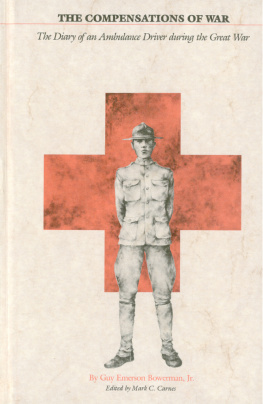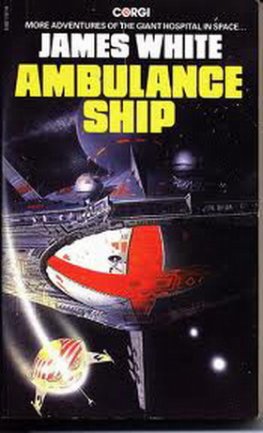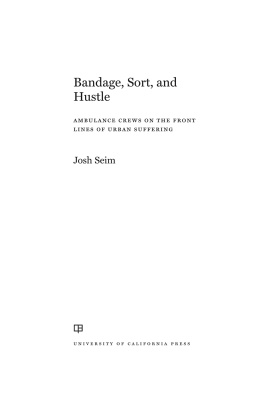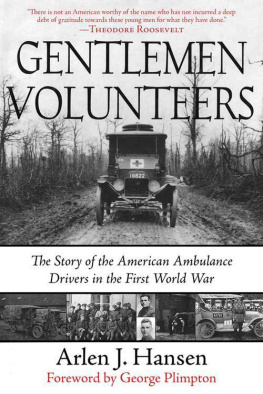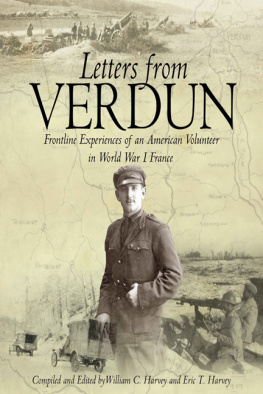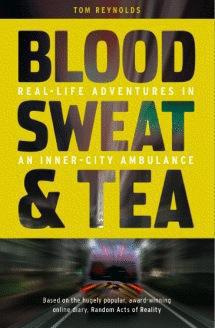THE COMPENSATIONS OF WAR
THE COMPENSATIONS OF WAR
The Diary of an Ambulance Driver during the Great War
By Guy Emerson Bowerman, Jr.
Edited by Mark C. Carnes

University of Texas Press
Austin
Cover illustration by Sue Durban
Copyright 1983 by the University of Texas Press
All rights reserved
Printed in the United States of America
First edition, 1983
Requests for permission to reproduce material from this work should be sent to: Permissions
University of Texas Press
Box 7819
Austin, Texas 78712
Library of Congress Cataloging in Publication Data
Bowerman, Guy Emerson, 18961947.
The compensations of war.
Includes bibliographical references.
1. Bowerman, Guy Emerson, 18961947. 2. World War, 19141918Medical careFrance. 3. World War, 19141918Personal narratives, American. 4. World War, 19141918CampaignsFrance. 5. FranceHistoryGerman occupation, 19141918. 6. Ambulance driversUnited StatesBiography. 7. Ambulance driversFranceBiography. I. Carnes, Mark C. (Mark Christopher), 1950 . II. Title.
D629.F8B693 1983 940.47573 82-23846
ISBN 0-292-71074-7
ISBN 978-0-292-74917-7 (e-book)
ISBN 9780292749177 (individual e-book)
For M
Introduction
St. Anthonys Boy Not Yet 21 Years Volunteers. So read the headline of the August 23, 1917, Teton-Peak Chronicle, published in eastern Idaho. Guy Emerson Bowerman, Jr., a twenty-year-old Yale freshman, had just arrived in France after enlisting in the United States Army Ambulance Service. Too young for the upcoming draft, Bowerman had enlisted from purely patriotic motives and a desire to serve his country. His photograph showed splendid physical development and a clear cut appearance which warrants us in saying that he will give a good account of himself. The editor joined the entire community in wishing him well in France.
There was good reason for the community to take particular note of Bowerman. His father, Guy Bowerman, Sr., founder of the Idaho State Bank, organizer of the Idaho State Bankers Association, and member of the executive council of the American Bankers Association in New York, was an economic leader in a farming community dependent on credit. Moreover, young Bowerman had for some time dated Marguerite Comstock of nearby Rexburg, daughter of the founder of the First National Bank of Rexburg. In a Mormon region, the eventual marriage of this Protestant couple no doubt seemed a foregone conclusion, thereby uniting two of the major banking firms in the region.
Bowerman had received a better education than most boys from rural Idaho. Rather than attend the provincial schools in the area, he was sent to East Side High School in Salt Lake City, where he was able to meet students of diverse backgrounds. After graduation he went to a preparatory school in Mercersburg, Pennsylvania, for one year and, in September 1916, to Yale. He was not a serious student his first year of college, and he became increasingly distracted by events in Europe.
When Congress declared war on the Central Powers in April 1917, Bowerman immediately made plans to join the air corps. But his parents, despite a patriotic enthusiasm for the war, insisted that their only child display his valor more sensibly. Bowerman chafed at this parental interference in what was perhaps the most important decision of his life, but he yielded to their wishes. He took solace in the fact that the ambulance corps were departing almost immediately. He commenced training on June 28, 1917, and boarded a troopship for France within five weeks.
Bowerman served as an ambulance driver in France and Belgium for a year and a half. He received the Croix de Guerre for conspicuous bravery and devotion to duty after having volunteered to evacuate wounded men during an especially severe bombardment. He was assigned to the army of occupation in Germany for two months, and then to France before being sent home. In the spring of 1919 he returned to Idaho and became engaged to Marguerite (referred to as M in the diary). Granted a years credit for his service abroad, Bowerman matriculated that fall as a junior at Yale. Yale did not then allow married students, so Bowerman quit school after his junior year, married his childhood sweetheart, and went to work as a teller at the Columbia Trust Bank of Salt Lake City. On January 1, 1921, he and his wife moved to California, where he worked as a teller in the Security First National Bank of Los Angeles. Several years later Bowerman and his father organized an independent bank in Los Angeles, which they sold to the Security First National Bank. Bowerman, Jr., was made branch manager of that bank. In 1931 he worked as a bank examiner for the Federal Reserve. Always impatient with close supervision, Bowerman longed to be his own boss. In 1936 he purchased a small Los Angeles exporting firm, which he managed until his death in 1947. He also operated family interests in lumbering in eastern Idaho. He and Marguerite had three children, Suzanne, Guy Emerson, and Joanne.
Bowerman began keeping a diary as soon as he arrived at the training camp outside Allentown, Pennsylvania, in June 1917, and he continued it throughout the war. While stationed in Belgium and France after the armistice, he recopied the diary and, in doing so, added a number of details and observations that he had not had time to put into the original version. This second version, which is the one reproduced here, is more complete, as well as more legible, than its predecessor. (The original version has been donated to the Yale University libraries; the version reproduced here is in the possession of Joanne Bowerman Wiley.)
The diary is interesting for many reasons; one was Bowermans attention to the details that often are missing from the generals accounts or the secondary literature on the war. Malcolm Cowley has commented on the spectatorial attitude that pervaded the ambulance service, and Bowerman was acutely conscious of his role as observer. Every word, every sight, every movement seemed to hold portent, and he copied them all down faithfully, occasionally lamenting his inability to decipher their meaning. After his troopship had been attacked by submarines, for example, he pondered the theatrical aspects of the event.
What a queer world this is! I bet there were a couple hundred men on board who had read, in open mouthed awe and admiration, stories of sea battles in our previous wars. Here they were holding box seats at a modern sea fight... and they seemed to enjoy it immensely... (Aug. 20, 1917)
Later in the war he watched as a passing infantry column was shattered by an artillery barrage; as the men began to scurry across the open field Bowerman thought the sight so unnatural that one cannot help but believe that he is at a movie (July 18, 1918). When the great German offensives of 1918 brought him into the war as never before, Bowerman confessed that he had not enlisted because of a love of France or a hatred of Germany, but because it was a duty to be accepted gladly because thru its performance we should see new sights and experience thrills and strange sensations. Now, he reflected, we are no longer supernumeraries in a show we are part of the cast itself (May 30, 1918).
Ambulance drivers were well placed to chronicle the war. They were usually assigned either to postes de secours (dressing stations) near the front lines or to evacuation centers that collected the wounded from the postes and sent them by large ambulances or trains to army hospitals. The handful of drivers at each poste were almost entirely unfettered by supervision. Bowermans section, attached to a French division, was probably more independent than those sections that were part of the American army. Section 585 was nominally under the supervision of the Mdecin Divisionnairea position roughly equivalent to the division surgeon of the American army. Bowermans M.D., known by the men as the Old Man, delegated routine decisions to two lieutenants, one French (Lieut. Jamon, often spelled Jamou or Jamoux in the diary) and the other American (Lieut. John R. Abbot). It appears that the American lieutenant was pretty much left on his own, and he in turn seemed reluctant to impose on his men. Thus Bowerman was free to spend time exploring trenches or abandoned chateaux, chatting with French soldiers, or otherwise soaking up as much information as possible about the war.
Next page
